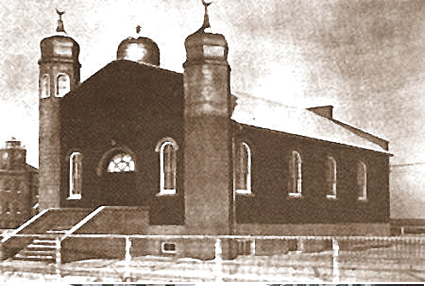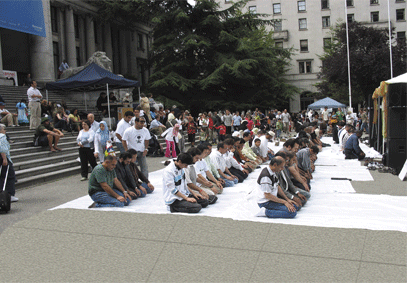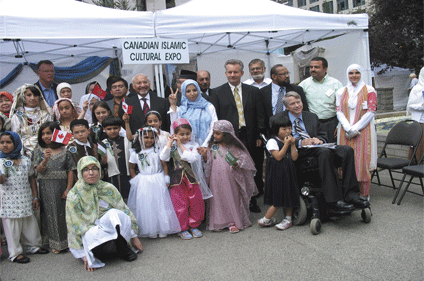 The Muslim community has built over 50 Islamic schools across Canada for their children to attend on a full-time or part time basis. The purpose of such schools is to provide students with a superior standard of education and to cultivate an Islamic spirit.
The Muslim community has built over 50 Islamic schools across Canada for their children to attend on a full-time or part time basis. The purpose of such schools is to provide students with a superior standard of education and to cultivate an Islamic spirit.
The first Canadian mosque was constructed in Edmonton in 1938, when approximately 700 Muslims inhabited the country. This building is now part of the museum at Fort Edmonton marking it as a historical Canadian site.
Muslims in Canada
Deep-Rooted in Nation’s History
The roots of the Muslim community in Canada are almost as old as the nation itself.
Canada: Arwa Hasan
The majority of the Muslims in Canada have been raised as Muslims, though there are minority groups who are converts to the religion. Muslims, just as other migrants, moved to Canada for its attractive education system, employment opportunities and social services.
Four years after Canada was founded in 1867, Census Canada counted 13 Muslims amongst the Canadian population. According to the most recent census of 2001, 579,640 Muslims, fewer than 2% of the general population, resided in Canada. The majority of Canadian Muslims (61%) live in the province of Ontario. The largest Muslim group, comprising Canadians of mostly Pakistani and Iranian origin, is settled in and around the Greater Toronto Area (GTA). About 5% of the overall Toronto population is Muslim, making the city home to the highest concentration of Muslims in any city in the United States or Canada.
Canada's national capital, Ottawa, hosts many Lebanese and Somali Muslims. Greater Montreal's Muslim communities comprise a large number of Canadians of Moroccan, Algerian and Lebanese descent, and smaller communities of Syrian, Iranian, Pakistani and Turkish origin. These communities are not exclusively Muslim, but are predominantly so. In addition to Toronto, Ottawa and Montreal, nearly every major Canadian metropolitan area has a Muslim community. They include Halifax (3,070), Windsor (10,745), Winnipeg (4,805), Calgary (25,920), Edmonton (19,580), Vancouver (52,590) and Victoria (1,230).
 The Canadian Charter of Rights and Freedoms guarantees every Canadian citizen the freedom of religious expression. Officially, Canadian Muslims face no religious discrimination. Religious intolerance is almost unheard of. In the light of events in recent years that have raised issues of national security, the rights accorded to the Muslim community have been challenged. Nonetheless, Canada has continued to ensure that the rights and freedoms of Canadian Muslims are not jeopardized.
The Canadian Charter of Rights and Freedoms guarantees every Canadian citizen the freedom of religious expression. Officially, Canadian Muslims face no religious discrimination. Religious intolerance is almost unheard of. In the light of events in recent years that have raised issues of national security, the rights accorded to the Muslim community have been challenged. Nonetheless, Canada has continued to ensure that the rights and freedoms of Canadian Muslims are not jeopardized.
Unlike some other nations where the rights of individual religious expression are limited, section 2-a of the Canadian Charter guarantees the freedom of religious expression. Accordingly, women in Canada are not singled out for wearing the hijab (veil) in schools and at the workplace.
Religious holidays and dietary restrictions are also respected in Canada, but outside major urban areas, it may be difficult to find halal (permitted in Islam) food. It is also often difficult to observe Islamic rules against usury. The Muslim community in Canada is just one among many ethnic, religious, racial and cultural communities that together make up Canada. However, though Canadian Muslims may be classified as Muslim for official governmental statistical and policy-making purposes, it does not mean that all are practicing Muslims. While they may be culturally Muslim, many of them lead secular lives in Canada.
The first Canadian mosque was constructed in Edmonton in 1938, when approximately 700 Muslims inhabited the country. This building is now a historical Canadian site and is part of the museum at Fort Edmonton. Other mosques and centers were built in major urban areas in the 1950s and 1970s. The majority of Muslims in Canada are Sunnis with a substantial number of Shia and adherents of other sects.
The Muslim community has built over 50 Islamic schools across Canada for their children to attend on a full-time or part time basis. The purpose of the schools is to provide students with a superior standard of education and to cultivate an Islamic spirit. Students follow the provincial education curriculum in addition to Islamic studies. In some cases, Arabic is also taught.
Ramadan iftars and Eid celebrations are common all over Canada. It is not unusual to find non-Muslims fasting in solidarity with their Muslim friends. Many community iftars are attended by local government officials. During Ramadan, Muslim students at universities put on ‘fast-a-thons’. On this day, Muslim and non-Muslim students fast together, and break it at sunset in an effort to raise money for local charities, and as a means to promote knowledge and understanding of the holy month of Ramadan. During this religious month, communities across the country organize food drives to collect donated food for distribution to families in need. Many Muslims gather at their local mosques for iftar and to offer their tarawih prayers.
The Muslim community in Canada is represented by several organizations: the Canadian Islamic Congress, which represents traditional opinions in the community and has the support of most mosques; the Muslim Association of Canada (MAC), which has its foundation in traditional Islamic ideology with a focus on dynamic application within the current Canadian context; Council of American Islamic Relations Canada (CAIR-CAN), which has become a leading advocacy and civil liberties groups for the Muslim community; and the Muslim Canadian Congress, a progressive, liberal group. Larger organizations representing North America as a whole, such as Islamic Society of North America (ISNA) and the Islamic Circle of North America (ICNA), are also active in Canada. In the Canadian Islamic community, there are well over 60 ethno-cultural groups and organizations to help bring them together and meet their needs.
 Student associations are also strongly established at most Canadian universities. The Muslim Student Association (MSA) at the University of Toronto, founded in 1966, is the largest student organization on the university campus. Student-led initiatives, such as the annually held Muslim Fest, and the Reviving the Islamic Spirit Conference, the largest Islamic event in Canada, are well supported and successful. On the western coast of Canada there are Islamic events such as the annual Canadian Islamic Cultural Expo and the Muslim Day at fairground known as Playland.
Student associations are also strongly established at most Canadian universities. The Muslim Student Association (MSA) at the University of Toronto, founded in 1966, is the largest student organization on the university campus. Student-led initiatives, such as the annually held Muslim Fest, and the Reviving the Islamic Spirit Conference, the largest Islamic event in Canada, are well supported and successful. On the western coast of Canada there are Islamic events such as the annual Canadian Islamic Cultural Expo and the Muslim Day at fairground known as Playland.
Apart from the cultural and Islamic events, Canadians recently enjoyed the first situation comedy about Muslims called "Little Mosque on the Prairie". The show, which made its debut earlier this year, attracted 2.1 million viewers at its premiere, impressive in a country where an audience of one million is considered a runaway hit.
Immigration has helped to make Canada a culturally rich, prosperous and progressive nation, where one out of every six Canadian residents was born outside of the country. Canada has a proud tradition of welcoming immigrants of different national and religious backgrounds, with immigration and refugee systems and network of organizations to help newcomers settle and integrate into Canadian society. Canada has always been a welcoming place for non-Muslims and Muslims alike.

 The Muslim community has built over 50 Islamic schools across
The Muslim community has built over 50 Islamic schools across  The Canadian Charter of Rights and Freedoms guarantees every Canadian citizen the freedom of religious expression. Officially, Canadian Muslims face no religious discrimination. Religious intolerance is almost unheard of. In the light of events in recent years that have raised issues of national security, the rights accorded to the Muslim community have been challenged. Nonetheless,
The Canadian Charter of Rights and Freedoms guarantees every Canadian citizen the freedom of religious expression. Officially, Canadian Muslims face no religious discrimination. Religious intolerance is almost unheard of. In the light of events in recent years that have raised issues of national security, the rights accorded to the Muslim community have been challenged. Nonetheless,  Student associations are also strongly established at most Canadian universities. The Muslim Student Association (MSA) at the
Student associations are also strongly established at most Canadian universities. The Muslim Student Association (MSA) at the